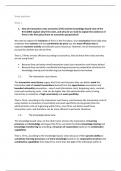Study questions
Week 1
1. How do transaction costs economics (TCE) and the knowledge-based view of the
firm (KBV) explain why firms exist, and why do we need to explain the existence of
firms in the first place (from an economics perspective)?
We need to explain the existence of firms in the first place, since economics historically tend
to believe that markets and the coordination by price was the most efficient way to
organize economic activity and allocate scarce resources. However, not all transactions are
pursued by markets but also by firms.
That is, if firms are less efficient according to economics, why do these firms exist and why
are we using them?
§ Because they can better avoid transaction costs (see transaction cost theory below)
§ Because they can better coordinate learning processes by cooperative structures for
knowledge sharing and transferring (see knowledge-based view below)
1.1. The transaction costs theory
The transaction costs theory argues that firms exist because they can better avoid the
transaction cost of market transactions derived from the opportunism assumption and
bounded rationality assumption – search and information costs, bargaining costs, contract
costs and monitoring costs – that can be higher than the administration costs of using
hierarchies in situations of high uncertainty and asset specificity.
That is, firms, according to the transaction cost theory, exist because the transaction costs of
using markets in situations of uncertainty and asset specificity can be greater than the
administration costs of organizing within firms, since firms can better avoid those
transaction costs, and therefore can be more efficient in particular situations.
1.2. The knowledge-based view
The knowledge-based view, on the other hand, stresses the importance of learning
processes and knowledge and argue that firms can better facilitate knowledge sharing and
knowledge transferring by providing a structure of cooperation based on its combinative
capabilities.
That is, firms, according to the knowledge-based, exists because of their greater ability to
coordinate learning processes and share knowledge based on its cooperative structure and
combinative capabilities that make firms more than the sum of the individuals within it.
, 2. How do the governance perspective and competence perspective on strategy
differ?
If we compare those perspectives, the competence perspective (knowledge-based view)
gives a different answer to the question why firms exists than the governance perspective
(transaction cost theory) does.
Whereas the transaction costs theory argues that firms exist because they can minimize
bounded rationality and mitigate opportunism and avoid transaction costs, the knowledge-
based view argues that firms exists because they are better in coordinating collective
learning processes and providing cooperative structures for knowledge sharing.
In sum, the governance perspectives give greater prominence to economics theory by
emphasizing on the cost-efficiency (economic view), and the competence perspective gives
greater prominence to organization theory by emphasizing learning (managerial view).
That is, the knowledge-based view widens the efficiency view of the transaction cost theory
that is associated with the shareholder primacy, given that it looks for achieving a positive
stakeholder approach for organizational learning (joint production), instead of only avoiding
a negative (transaction costs).
3. According to Ghoshal (2005), what are the problems of management education,
and how do they relate to the two views?
Ghoshal (2005) argues that academic research, based on a scientific approach (exclusion of
human intent) by the pretense of knowledge and liberalism ideology (gloomy vision),
negatively affects the practice of management because of its problematic self-fulfilling
nature in terms of providing amoral theories to students.
Whereas a theory within psychical sciences – if wrong and based on unrealistic assumptions
- does not actually change the behavior of the psychics, an amoral theory associated with
management that is based on false assumptions within social sciences does actually change
the behavior of managers.
If we link these critics to the transaction cost theory and knowledge-based view, the
adoption of the liberalism ideology (restricting the cost of human imperfections) and
exclusion of human intent (morality) can be seen as assumptions associated with the
transaction cost theory.
Specifically, the current flawed assumptions that make management theories dehumanizing
by looking at employees as mere recourses and costs to be minimized can be linked to the
transaction-cost theory and efficiency perspective for shareholder value, whereas the
knowledge-based view is focusing on a more human-centered approach to management
that underscores the potential for cooperation and stakeholder values.





